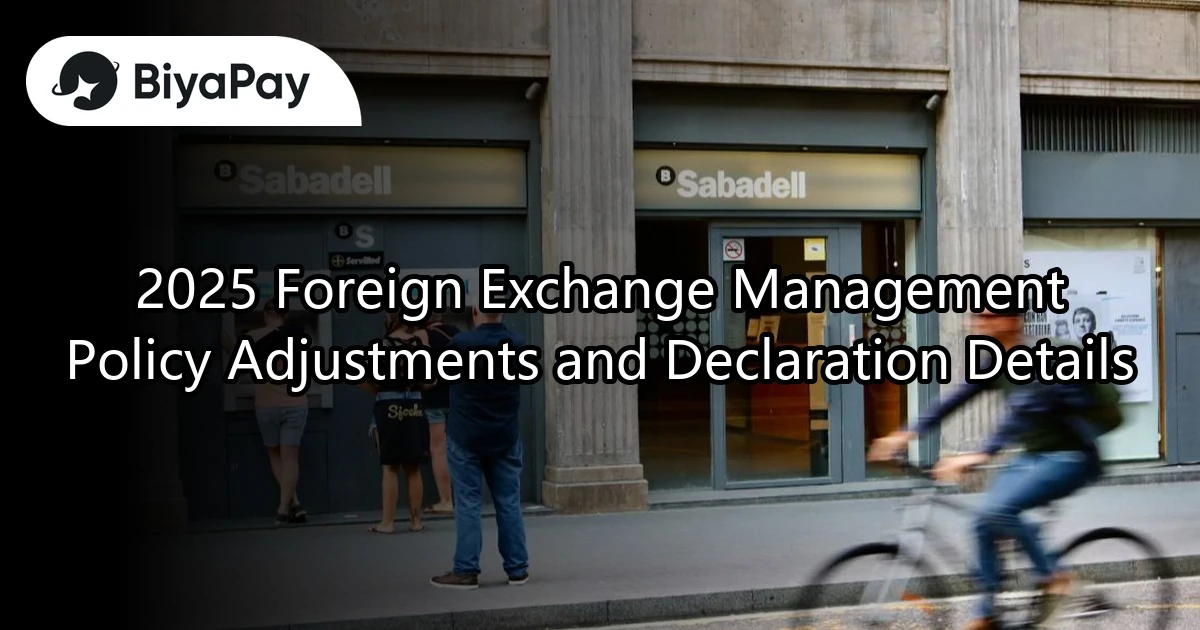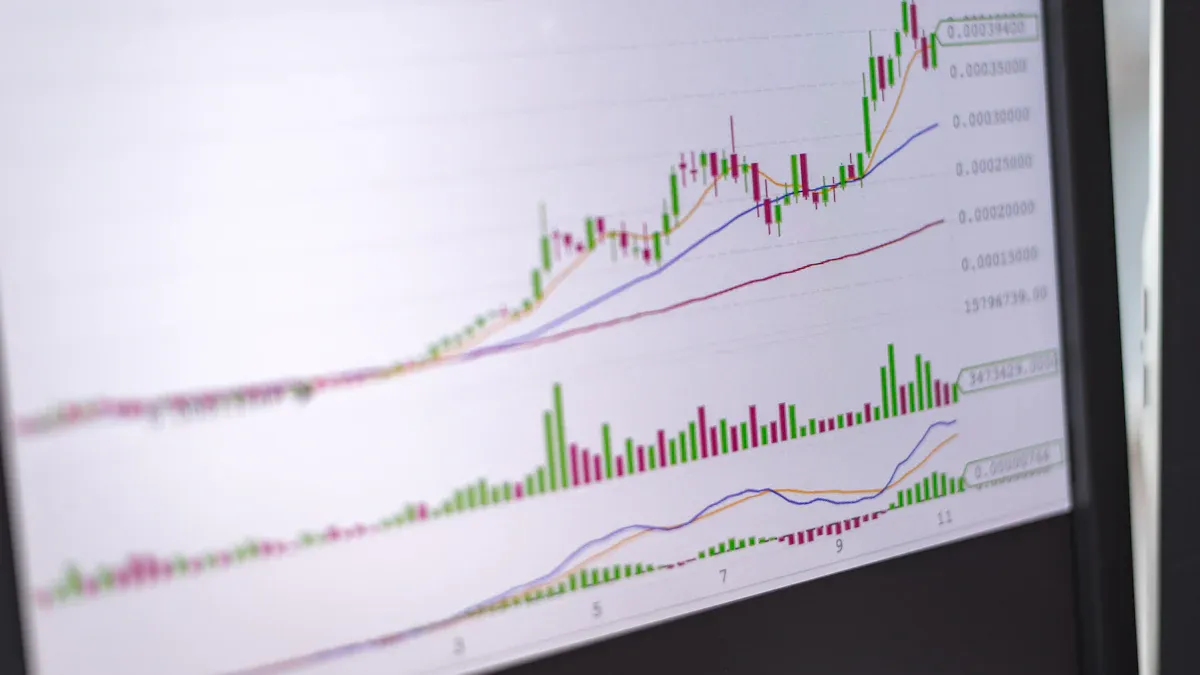- EasyCard
- Trade
- Help
- Announcement
- Academy
- SWIFT Code
- Iban Number
- Referral
- Customer Service
- Blog
- Creator
2025 Foreign Exchange Management Policy Adjustments and Declaration Details

Image Source: pexels
The 2025 foreign exchange management policy adjustments have brought significant changes to international remittance declaration requirements. When receiving overseas U.S. dollar remittances, the Bank of China has stricter reviews of fund sources and amounts. In contrast, Hong Kong banks’ foreign exchange policies are more flexible, allowing higher U.S. dollar remittance amounts, with simpler declaration processes. These policy differences may influence your decisions when choosing remittance channels.
For individuals and businesses, the implementation of the new policies not only relates to compliance but also directly affects the convenience of fund flows. Understanding and adhering to international remittance declaration requirements is a critical step in ensuring financial security and business continuity.
Key Points
- The 2025 foreign exchange policy has increased the non-declaration threshold, raising the non-declaration amount for individuals’ international receipts and payments from $5,000 to $10,000, simplifying the process for small international remittances.
- The new policy clarifies international remittance declaration requirements, stating that CNY transactions between domestic residents and domestic non-residents do not require declaration, reducing transaction costs.
- Optimized audit processes have improved efficiency through information technology, shortening the review time for international remittance declarations, ensuring smoother fund flows.
- Understanding declaration subjects and applicable scopes is key to compliant operations, with all individuals and businesses involved in cross-border transactions required to fulfill declaration obligations.
- Compliant declarations not only avoid administrative penalties but also protect personal credit records, promoting steady business development.
Major Adjustments to the 2025 Foreign Exchange Management Policy

Image Source: pexels
Increase in Non-Declaration Threshold
The 2025 foreign exchange management policy has adjusted the non-declaration threshold, further simplifying the declaration process for certain transactions. According to the new regulations, the non-declaration amount for resident individuals’ international receipts and payments has been raised from the previous $5,000 to $10,000. This change provides greater convenience for you when handling small international remittances, reducing unnecessary declaration steps.
Additionally, CNY receipts and payments between domestic resident individuals and domestic non-resident individuals have been included in the non-declaration scope. This means that if you conduct CNY transactions with domestic non-resident individuals, you no longer need to submit related declaration materials. This policy adjustment significantly reduces transaction costs while improving the efficiency of fund flows.
New International Remittance Declaration Requirements
The new policy has optimized international remittance declaration requirements, clarifying more details. Below are the specific changes:
| Change Content | Specific Description |
|---|---|
| Increased Non-Declaration Threshold | The non-declaration amount for resident individuals’ international receipts and payments has been raised to $10,000. |
| Adjusted Declaration Requirements | CNY receipts and payments between domestic resident individuals and domestic non-resident individuals are temporarily exempt from declaration. |
| Adjusted Scope of Refund Recipients | Domestic receipts and payments do not require declaration if the international counterparty has not recorded the transaction. |
| Non-Declaration and Non-Disbursement Deadlines | Added requirements for setting relevant deadlines, removing the phrase “report to the State Administration of Foreign Exchange for filing.” |
These adjustments allow you to more clearly understand the declaration scope and requirements when handling international remittances, avoiding compliance risks due to unfamiliarity with policies. Especially for businesses frequently handling cross-border transactions, these changes can effectively reduce declaration workloads and improve operational efficiency.
Changes in the Audit Process
The optimization of the audit process is another major highlight of the 2025 foreign exchange management policy adjustments. The new policy has significantly improved the efficiency and accuracy of data audits through the application of information technology. Below are the specific improvements:
- Emphasis on platform audits to improve the quality of data reports, ensuring data consistency and comparability.
- During the census process, immediate collection and review are implemented to ensure data accuracy.
- Unified national statistical data collection and processing software to improve data processing efficiency, saving resources.
- Increased application of information technology to ensure the timeliness and accuracy of census data.
These improvements mean that when you submit international remittance declarations, the audit time will be significantly reduced, and the efficiency of fund flows will improve accordingly. For example, Hong Kong banks have begun adopting similar technological measures, further simplifying customers’ declaration processes. This technology-driven optimization not only reduces errors in manual audits but also provides you with a more efficient service experience.
Detailed Explanation of International Remittance Declaration Requirements and Process

Image Source: pexels
Declaration Subjects and Applicable Scope
International remittance declaration requirements clearly define declaration subjects and applicable scopes. You need to understand which individuals or institutions have declaration obligations to ensure compliant operations. According to the “Measures for the Declaration of International Balance of Payments Statistics,” Chinese residents and non-Chinese residents with economic transactions in China are required to fulfill declaration obligations. In statistical terms, “residents” include both institutions and individuals, meaning that any individual or business involved in cross-border economic transactions must declare.
In practice, confirming declaration subjects may involve complex scenarios. For example, when multiple affiliated enterprises of a multinational company in China use a unified management system for cross-border personal information transfers, each must declare separately. The “whoever transfers, declares” principle mentioned in the Q&A by Zhejiang Province’s Cyberspace Administration further emphasizes the specific requirements for declaration subjects. For individuals, if you are a domestic company acting as a personal information processor and transferring personal information overseas, you also need to fulfill declaration obligations.
Declaration Methods and Steps
Understanding declaration methods and steps can help you quickly complete international remittance declarations. Below are the main steps of the declaration process:
- Confirm Declaration Subject: First, you need to confirm whether you fall within the scope of declaration subjects.
- Prepare Declaration Materials: Collect the required declaration materials based on the transaction type and amount.
- Log into the Declaration Platform: Submit declaration information through the bank’s “Digital Foreign Exchange” platform bank version.
- Fill in Declaration Information: Enter basic information such as transaction amount and fund source on the platform.
- Submit Declaration: After completing the information, submit the declaration and await review.
If the bank finds errors in the submitted basic information, it will revise them in its own computer processing system and re-upload to the declaration platform. This process optimization ensures the accuracy and timeliness of declaration data.
Required Materials List
During the declaration process, you need to prepare the following materials:
- Individual or Business Identity Proof: Including ID cards, business licenses, etc.
- Transaction Proof Documents: Such as contracts, invoices, or receipts to prove the authenticity of the transaction.
- Fund Source Proof: For example, bank statements or fund transfer records.
- Declaration Form: International balance of payments statistical declaration form filled out as required by the bank.
The “Detailed Rules for the Implementation of International Balance of Payments Statistical Declaration through Banks” issued in 2022 specifies the detailed requirements for declaration materials. You can refer to the relevant documents to ensure all materials are complete.
By preparing these materials in advance, you can reduce time costs during the declaration process and improve efficiency. Hong Kong banks’ declaration processes are relatively simple, often requiring only basic transaction information to complete declarations. This flexibility provides you with more options.
Data Processing and Foreign Exchange Regulatory Responsibilities
Declaration Data Processing Methods
The 2025 foreign exchange management policy has optimized the processing methods for declaration data, improving efficiency and accuracy. You need to understand the main stages of data processing to better cooperate with the declaration process. Below are the specific steps for data processing:
| Data Processing Stage | Description |
|---|---|
| Data Audit | Verify the initially reviewed grassroots data to ensure logicality, completeness, and accuracy. |
| Feedback and Issue Handling | Identify data discrepancies and promptly return them to lower-level institutions or subjects for verification and correction. |
| Data Processing per Standards | Adjust data according to statistical standards to ensure comparability and consistency. |
| Timely Task Completion | Develop a schedule, strengthen time management, and ensure the timeliness of data processing. |
| Data Evaluation | Includes error assessments for sampling surveys to ensure data accuracy and logicality. |
These steps ensure efficient processing of declaration data. The declaration information you submit undergoes strict audits, with any issues promptly fed back and corrected. This process optimization not only improves data quality but also reduces the likelihood of declaration errors.
Foreign Exchange Bureau’s Regulatory Responsibilities
The Foreign Exchange Bureau assumes clearer regulatory responsibilities in the 2025 policy, ensuring the compliance of foreign exchange transactions and data security. Below are the main responsibilities of the Foreign Exchange Bureau:
- Supervising Declaration Processes: The Foreign Exchange Bureau oversees whether declaration subjects submit data as required and investigates non-compliant behaviors.
- Optimizing Statistical Systems: For example, the “Statistical System for External Financial Assets, Liabilities, and Transactions” refines declaration categories for non-financial institutions, enhancing data submission convenience.
- Strengthening Data Management: The Foreign Exchange Bureau optimizes data collection scopes and element definitions through unified statistical software and technical means, ensuring efficient data processing.
These clearly defined responsibilities provide you with greater confidence during declarations. The Foreign Exchange Bureau’s oversight not only ensures transaction transparency but also offers more efficient service support.
Data Security and Privacy Protection
Data security is a critical component of foreign exchange management policies. The 2025 policy specifies measures for data protection to ensure your information is not misused. Below are the relevant regulations:
- Data Classification and Grading: According to the “Measures for Data Security Management in the Business Sector of the People’s Bank of China,” all data must be classified and graded per resource directories.
- Data Storage and Backup: The policy requires encrypted data storage and regular backups to prevent information loss.
- Risk Monitoring and Handling: The Foreign Exchange Bureau conducts risk monitoring of data processing activities, addressing issues promptly.
Non-compliant behaviors face severe penalties. For example, in 2024, Meta was fined $1.4 billion for illegally collecting biometric data. In the same year, LinkedIn was fined $336 million for GDPR violations. Additionally, the “Personal Information Protection Law” stipulates that companies leaking information may be required to suspend or terminate services.
You need to ensure the authenticity and compliance of declaration data to avoid penalties for non-compliance. By adhering to policies, your personal and transaction data will be better protected.
Consequences of Non-Compliance with Declaration Requirements
Potential Administrative Penalties
Failure to declare international remittances as required may lead to administrative penalties. China’s Foreign Exchange Bureau adopts strict measures against non-compliant behaviors to ensure the compliance of foreign exchange transactions. Below are case data on administrative penalties in recent years:
| Penalty Target | Number of Cases |
|---|---|
| Listed Companies | 92 |
| Controlling Shareholders, Actual Controllers | 55 |
| Directors, Supervisors, Senior Executives | 153 |
| Other Individuals | 20 |
| Bond Issuers | 3 |
Administrative penalty standards vary by case nature. General cases adopt the preponderance of evidence principle, emphasizing administrative efficiency and maintenance of social order. For cases involving restrictions on personal freedom or heavier penalties, enforcement agencies apply the beyond reasonable doubt principle to protect individual rights. You need to understand these standards to avoid penalties for non-declaration.
Impact on Personal Credit Records
Failure to declare as required may negatively impact your personal credit record. China’s credit system records individuals’ non-compliant behaviors, including undeclared international remittances. These records may lead to the following consequences:
- Loan Restrictions: Banks may reject your loan applications or increase loan interest rates.
- Credit Card Application Difficulties: Credit card approvals may be denied due to credit record issues.
- Impact on Employment Opportunities: Some companies review employees’ credit records, and credit issues may affect your career development.
Hong Kong banks’ credit evaluation systems also consider individuals’ declaration records. If you conduct business with Hong Kong banks, non-declaration may lead to account freezes or other restrictions. Maintaining a good credit record is crucial for your financial and career development.
Potential Risks to Business Operations
Businesses failing to declare international remittances as required may face significant operational risks. Below are potential impacts:
- Increased Fines: Businesses may face high fines for non-compliance, affecting financial conditions.
- Business Restrictions: The Foreign Exchange Bureau may limit a business’s cross-border transaction privileges, causing operational disruptions.
- Reputation Damage: Non-compliant behaviors may be publicized, harming the business’s market image and customer trust.
For example, in 2023, 93 cases involved financial fraud, accounting for 49.5% of information disclosure violation penalty cases. These cases involved listed companies such as ZJCC, ZDYS, and YJGF. You need to ensure your business’s declaration processes are compliant to avoid similar risks.
By adhering to declaration requirements, you can protect personal credit records, reduce business operational risks, and avoid administrative penalties. Compliant operations are not only a legal requirement but also a critical step in maintaining financial security.
The 2025 foreign exchange management policy adjustments bring new opportunities and challenges for individuals and businesses. You need to pay attention to the increased non-declaration threshold, changes in international remittance declaration requirements, and optimized audit processes. These policy changes directly impact the efficiency and compliance of fund flows.
Compliant declarations are not only a legal requirement but also key to long-term development. Below are the positive impacts of compliant declarations for individuals and businesses:
- Promoting steady business development.
- Helping expand market coverage.
- Ensuring data security and compliance with legal requirements.
To better adapt to policy changes, you can prepare declaration materials in advance, familiarize yourself with the declaration process, and seek advice from professional institutions. These measures will help you reduce risks, improve efficiency, and ensure financial security.
FAQ
1. How Do I Determine If I Need to Declare an International Remittance?
You need to determine whether a declaration is required based on the transaction amount and type. If the amount exceeds $10,000 or involves cross-border transactions, declaration is mandatory. Hong Kong banks typically provide clear declaration guidelines to help you quickly confirm your declaration obligations.
2. What Should I Do If My Declaration Information Is Incorrect?
The bank will notify you to revise errors. You can resubmit correct information through the “Digital Foreign Exchange” platform. Hong Kong banks’ systems support real-time feedback, ensuring the accuracy of declaration data.
3. Are Additional Fees Required During the Declaration Process?
Declarations themselves typically do not incur fees, but banks may charge related service fees. Hong Kong banks’ fees usually range from $50 to $100, depending on the transaction type and amount.
4. What Impacts Can Non-Declaration Have on Businesses?
Businesses may face fines, cross-border transaction restrictions, and reputation damage. Hong Kong banks may freeze accounts or limit transaction privileges. Compliant declarations are key to avoiding these risks.
5. How Can I Ensure the Security of Declaration Data?
You can choose encrypted data storage and regular backups. The Foreign Exchange Bureau and Hong Kong banks use advanced technical measures to protect data privacy, ensuring information is not misused or leaked.
The 2025 forex policy adjustments simplify international remittances, raising the non-reportable amount to $10,000 (for resident individuals), but strict compliance and high fees ($50-100) still burden businesses and individuals. BiyaPay offers efficient, compliant cross-border payment solutions, supporting conversions across 30+ fiat currencies and 200+ cryptocurrencies with remittance fees as low as 0.5%, covering 190+ countries with same-day delivery. Whether for trade settlements or personal transfers, BiyaPay streamlines declarations and ensures compliance. You can also invest in U.S. and Hong Kong stocks directly on the BiyaPay platform without needing an additional overseas account, optimizing capital use. Join BiyaPay now to reduce costs and enhance efficiency! Licensed by U.S. MSB and SEC, BiyaPay uses advanced encryption, with real-time exchange rate tracking to minimize losses and a 5.48% APY through current investment products. Sign up with BiyaPay for compliant, hassle-free transfers!
*This article is provided for general information purposes and does not constitute legal, tax or other professional advice from BiyaPay or its subsidiaries and its affiliates, and it is not intended as a substitute for obtaining advice from a financial advisor or any other professional.
We make no representations, warranties or warranties, express or implied, as to the accuracy, completeness or timeliness of the contents of this publication.




Contact Us
Company and Team
BiyaPay Products
Customer Services
is a broker-dealer registered with the U.S. Securities and Exchange Commission (SEC) (No.: 802-127417), member of the Financial Industry Regulatory Authority (FINRA) (CRD: 325027), member of the Securities Investor Protection Corporation (SIPC), and regulated by FINRA and SEC.
registered with the US Financial Crimes Enforcement Network (FinCEN), as a Money Services Business (MSB), registration number: 31000218637349, and regulated by FinCEN.
registered as Financial Service Provider (FSP number: FSP1007221) in New Zealand, and is a member of the Financial Dispute Resolution Scheme, a New Zealand independent dispute resolution service provider.




















